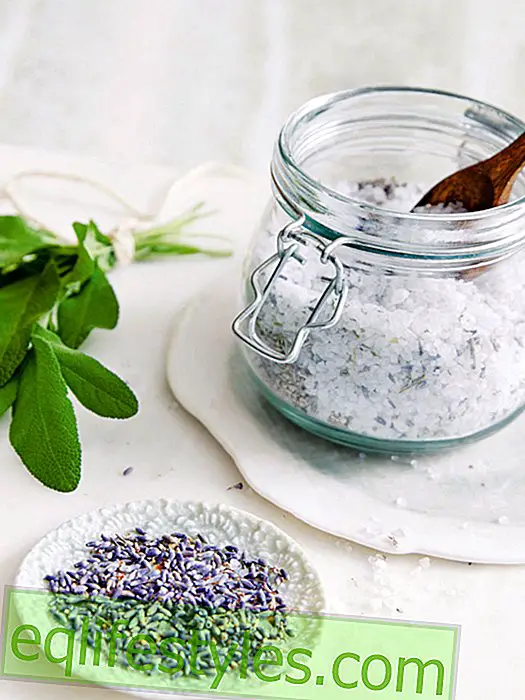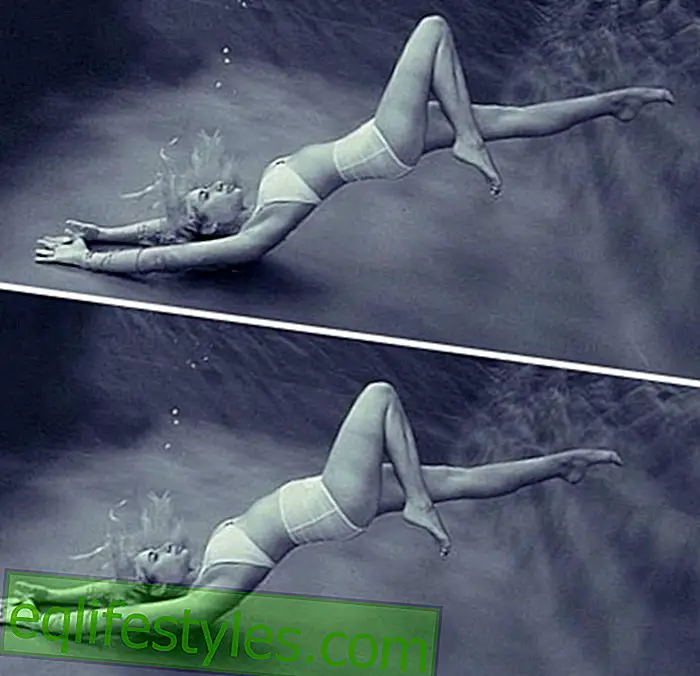
Photo: © Dudarev Mikhail - Fotolia.com
- time for me
- Everyone can learn to relax properly
- Error 1: Work costs strength, leisure gives which
- Full power ahead
- 1. Ask crucial questions
- 2. Use rituals to decelerate
- 3. Go outside often
- 4. Plan your free time with vision
time for me
Holiday - the best time of the year? That was once. Because many people can not really switch off even from the workplace. According to surveys, 70 percent of Germans do not succeed in turning off their job after work. "We are already at home, but our head is still in the company, " says stress researcher Christoph Eichhorn. And not only the world of work demands more and more from us, our everyday life is clocked faster and faster. Every day is used to the maximum. In addition, women often shoulder the double burden of family and job. "No wonder that the energy balance is so negative in the long run, we use more power than refueling - and it is often difficult to ever relax and let go, " said psychologist Eichhorn.
Everyone can learn to relax properly
But how can the continuous load be reduced and the stress spiral broken? "The problem is that many people simply do not know what they could do to recover well, " says the expert. Particularly treacherous is our psychological burden. While people were more physically exhausted until about 50 years ago, today we are mentally burned out.
The crux: For physical fatigue we have developed an innate sense of recovery in the course of evolution. But not for mental exhaustion. "So our organism intuitively knows what it needs to regenerate when we're physically exhausted: rest, take a bath, read a book, or just do nothing - nobody would even think about a two-hour bike ride after a long mountain hike close." For the stressed soul, however, we lack this intuitive sense. That's why today we need strategies to fill up the energy supplies of our psyche.
The good news is: Everyone can learn to relax. But what is recovery ? "Unfortunately, there are many wrong views in public, " says Eichhorn. What these are and what helps with refueling, he explains here.
Error 1: Work costs strength, leisure gives which
Not correct! The viewpoint decides work is bad and leisure good? The bill is not that easy. The researcher Mihály Csíkszentmihályi found out in experiments: People are even happier while working and are more active in their work than in their free time. Then they feel rather bored and unfulfilled. Paradoxically, all still want more free time. The explorer's explanation: Most people see work as a burden and a time taken away from life. "With this attitude, however, it is impossible to recognize and appreciate the positive aspects of this activity, " says Eichhorn.
On the other hand, those who learn to see their work as something valuable and at the same time do not waste their free time get the feeling that his life is more valuable overall. How it works? "By changing the view of things."
According to Eichhorn, one can make any work meaningful. A stonemason can knock boring cubes. Or he can help build a cathedral. As an employee at the waste disposal one can say: "I empty garbage bins all day long." Or full of pride: "Without me, our life together would be unbearable."
In addition, a lot of free time does not necessarily mean that we recover well. "We have to take care of our free time, make it individual and active for us, so that it becomes sustainable and of high quality."

Not correct! We live like unprofessional top athletes. In competitive sports, for many years, the focus has been solely on improving exercise processes in order to make the athletes physically fitter and more efficient. "Only the realization that you have to recover well in order to deliver top performance brought the turnaround."
The fact is: after maximum tension and the highest concentration of stress hormones in the blood, the body needs 48 to 72 hours to recover, with mental stress even up to 96. But what do we do everyday coping athletes?
We behave like top athletes, go to our limit. But we do not rest afterwards. Although we do not need a break of two days for the average daily workload. But small recreational islands are important: "Occasionally, at least for a few minutes, initiate the inner retreat, disconnect, switch off and do something for yourself." Those who put such moments into everyday life prevent stress the best, "explains Eichhorn.

Not correct! Holiday is totally overrated "For the recovery, the length of a holiday plays a minor role, " says Christoph Eichhorn. Everyday life will catch up with you anyway. "After just a few days at work, many feel as stressed again as they were before they left - some even in the evening before their first day at work."
Dr. Charlotte Fritz from the University of Braunschweig was able to show that the holiday recovery fizzles after four weeks at the latest. "It is not enough if we wait for the next vacation, " says Eichhorn. "We have to find ways to regenerate ourselves in everyday life, preferably every day." The more regularly we do that, the less exhausting life seems to us.

Not correct! With no effort, we would get bored. There are two types of stress. The one - called Disstress - is bad, makes you sick, forgetful and depressed. The other one, the so-called Eustress, even makes you happy. Positive efforts also cost energy, but they do not burden the body.
On the contrary, we are even motivated, because the brain then produces dopamine, a body-own fortune drug, with which it rewards us for our effort. "Anyone who refrains from any kind of effort and effort due to their concern for stress will not be doing any good, " clarifies Eichhorn.
Those who never have to master any challenges, for example on the job, even have a 2.5 times higher risk of heart attack than non-bored people, researchers found. For those who have a threadbare everyday life, tends to an unhealthy lifestyle, for example, eats ready meals more often than cooking themselves, the scientists explain the results of their study.

Not correct! Social support is an effective stress buffer. Especially when everyday life is again particularly turbulent, we should treat ourselves to a meeting with friends: sitting together in the café, enjoy coffee or tea, chat about the things of life, switch off and let drift - all this promotes our recovery especially Good. And incidentally, pending everyday problems can be solved.
"Research also confirms what we have long known: shared suffering is half suffering, shared pleasure is double pleasure, and positive emotions are not an unnecessary luxury - they absorb stress particularly effectively, " says Eichhorn.

Not correct! Sometimes we need light entertainment. Anyone who bangs in front of the television every night because he feels too dull for everything else, of course, does not recover by any means. On the contrary: television stresses our brain by the sensory overload, such as the rapid image changes and often hinders the letting go. But sometimes there is nothing better than to watch an entire Sunday afternoon old episodes of the favorite series!
"Every now and then we need light entertainment, " says Eichhorn. Psychologists speak of escapism in such activities and mean: We escape the everyday life, get out of the hamster bike for a short time. And that is good! Because we really like it at the moment - and that's a great way to recover. Because then we only devote ourselves to ourselves. The important thing is that we eventually find the button.

Not correct! Doing nothing does not automatically bring regeneration. After a stressful day, we often feel inwardly disturbed, but at the same time we are exhausted and without energy, have no more desire. It seems to us the easiest thing to turn on the TV and sit on the sofa. "It would be better, however, to do something that gives us strength again - sports, for example, although the movement costs physical energy, it invites us mentally with new power, " explains Eichhorn.
"Besides, we have to learn to listen better - to find out what really does us good." The expert recommends, "If you've lost the sense of what's right for you, just let yourself drift in. Watch attentively what's good for you on a day off, write it down on a list, and do it again and again some of that."

Not correct! Switching off means switching off. The technical achievements have definitely disadvantages for our everyday life: The constant accessibility blurs the line between work and private life. Or we feel like missing something important if we do not squint every hour at the mobile phone display. But we can barely switch off like that!
What to do: Turn off all devices? "Yes, at least for a few hours - especially on days off, " advises Eichhorn. "Set limits: E-mails will be answered around the morning until twelve, then everything will be switched off." Be aware of the periods of rest.

Insert mini-breaks ...
... WAKE UP: Observe your breath for a few moments before jumping out of bed. Stretch and stretch extensively. This clears the mind, mobilizes muscles and joints.
... UNDER THE SHOWER: While washing your hair, massage the whole head and drumming on it with your fingertips. This stimulates the scalp and nerves, awakens the gray cells.
... AT THE DESK: Take a deep breath before each new work step. Stick a small blue dot on the phone. It reminds you to pause for a moment before you pick up the phone. This also promotes your concentration.
... GOING: Focus on your feet again and again. How do they set up, how do they roll off? That calms the mind.
... AFTERNOON: Travel with an exercise into an inner space of silence and darkness. To sit down relaxed, put your index and middle finger gently on the closed eyelids and close your ears with your thumbs. Place the tips of the ring fingers on the nostrils and let the little fingers rest on the upper lip. Breathe slowly and deeply. Relax for about seven minutes in this position.
... ON THE HOMEWAY: Pay attention to your posture. How are you sitting? Like a sip of water in the curve? Or upright, with relaxed shoulders, a light smile, and unclenched hands? Good to switch off: close your eyes and slowly use the eyeballs to draw the infinite sign - a horizontal figure of eight. This brings peace and clarity to your thoughts. The symbol for mini-breaks can also be used in the job: trace the lying eighth with a pen a few times without stopping - just like that or when making a call. The self-forgetting painting makes for pauses for thought.
... IN THE EVENING: Relax with Aromatherapy. Essential oils such. As lavender, lemon balm and neroli (drugstore from about 3 euros) have nerve-strengthening, soothing and mood-enhancing. Add 2 - 3 drops of the oil to a scent lamp and breathe deeply.

Full power ahead
These strategies make it easier for you to recharge your batteries - and thus prevent stress.
1. Ask crucial questions
Analyze your life situation with questions like: In which everyday life am I? Where do I have to bend in the job, and how could I counteract on vacation? What am I fun, invigorating me?
"Most people recover best with experiences that create contrasts to everyday life, " says Eichhorn. If you roll files around every day, you can let the adventurer out on a hike through the mountains. People who talk day by day can refuel with a book by the sea alone. Ask yourself: what can you do to make you feel better in everyday life? What helps you to tackle professional and personal challenges? And: Say goodbye to perfectionism.
Doris Märtin explains how to do this in her book "Good is better than perfect: the art of making life easier", Deutscher Taschenbuch Verlag, 8, 90 Euro.
2. Use rituals to decelerate
US researcher Donald Woods advises connecting day-to-day transitions, such as homecoming after work, with a mini plot. This can be a look to the sky, a short pause, an eye close or a deep breathe. This helps to separate past, present and future. Effect: Leaving the job at the door.
3. Go outside often
Whether vacation or weekend - spend your free time not only at home. Because there you do the ironing at the end, instead of recovering. You do not have to fly straight to Mallorca - a few days on the Baltic Sea or a visit to the zoo or park bring relaxation .
4. Plan your free time with vision
Often we spontaneously plan days off - namely, when they are just getting on with the job. "But then there is the danger that you will not get up to activities." Better: get out of the calendar and enter specifically free days for the next three months. Plan your activities for the time being. To recover, a mix of relaxation and tension is the most effective, for example, first swimming, then massaging.
You can find out even more about recovery in "Well recover - better living - the practical book for everyday life" by Christoph Eichhorn, Klett-Cotta, 14.95 euros









